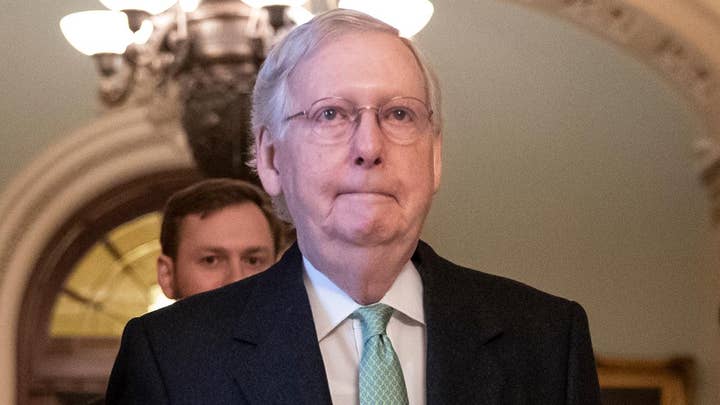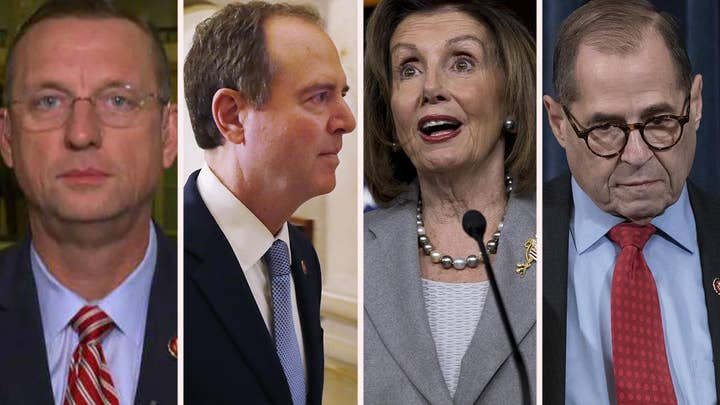Schumer: McConnell taking cues from White House; 'very partisan, very slanted, very unfair'
Senator Chuck Schumer discusses Democrats demands for the Senate impeachment trial and reasons he deserves four witnesses
Congressional Democrats have fiercely criticized Senate Majority Leader Mitch McConnell, R-Ky., and other top Republicans in recent weeks for what they say is a lack of impartiality regarding President Trump’s looming trial in the Senate.
But the proceedings of the last impeachment have proved a recurring headache for some of these Democrats, whose past comments on then-President Bill Clinton's trial have come back to haunt them -- and in some cases undercut their message today.
From Senate Minority Leader Chuck Schumer to House Judiciary Chairman Jerry Nadler, both from New York, congressional Democrats are being reminded that they once made comments eerily similar to those being uttered now by their Republican colleagues -- and vice-versa.
MODERATE GOP SEN. MURKOWSKI 'DISTURBED BY MCCONNELL'S IMPEACHMENT COMMENTS
Schumer recently lambasted McConnell for telling Fox News’ Sean Hannity that he will be “coordinating" with the White House and "there will be no difference between the president's position and our position as to how to handle this."
McConnell was also criticized for telling reporters last month he would not be “an impartial juror” in any Trump trial -- which is in a holding pattern as Speaker Nancy Pelosi sits on articles of impeachment for now.
Schumer said recently he is “utterly amazed” by McConnell’s comments and labeled them an “astounding admission of partisanship” during a speech on the Senate floor.
Turning back the clock 20 years, however, shows Schumer making comments similar to those of the current Senate majority leader.
During a 1999 appearance on CNN's "Larry King Live," Schumer – who was beginning his first term in the Senate – indicated he already had a “pre-opinion” on how he would vote in Clinton’s trial and argued that the Senate’s role was not the same as a jury’s role in a standard criminal trial.
"We have a pre-opinion," Schumer said in remarks CNN dug up recently. “This is not a criminal trial, but this is something that the Founding Fathers decided to put in a body that was susceptible to the whims of politics."
He added: “In fact, it's also not like a jury box in the sense that people will call us and lobby us. You don't have jurors called and lobbied and things like that. I mean, it's quite different than a jury. And we're also the judge."
SCHUMER PANNED CLINTON IMPEACHMENT TESTIMONY AS 'THEATER,' NOW SEEKS 4 WITNESSES IN TRUMP TRIAL
And while McConnell took heat from Democrats for vowing coordination with the White House, that would not be unprecedented. According to then-Washington Post reporter Peter Baker’s book, “The Breach: Inside the Impeachment and Trial of William Jefferson Clinton,” Senate Democrats coordinated with the White House on a number of impeachment-related issues behind the scenes.
According to Baker, one of those arrangements involved White House Counsel Charles Ruff arranging a “secret signal” with Democratic leadership. If Ruff wanted to rebut anything from the Republican House managers, something rules didn’t allow, he pre-arranged with then-Senate Democratic Leader Tom Daschle’s aides for a senator to submit a question to then-Chief Justice William Rehnquist asking the White House to respond.
Aides reportedly would "fill in the name" of one of several "default senators" -- such as Sen. Patrick Leahy, D-Vt., and then-Sen. Chris Dodd, D-Conn. -- who had agreed to allow themselves to "be used in this way."
The book also detailed how then-Sen. Tom Harkin, D-Iowa, spoke with Clinton and helped organize a pressure campaign in defeating Sen. Susan Collins’, R-Maine., attempt to adopt “findings of fact” by which the Senate could take a majority vote on whether Clinton lied under oath and impeded discovery of evidence even if the chamber failed to convict him. Baker described how Clinton “tracked down Harkin in the Democratic cloakroom during a break in the trial to vent his outrage" at what Collins was cooking up.
“Harkin needed no convincing,” Baker wrote. “He had immediately recognized the pernicious effects of the findings plan and set about trying to destroy it before it got too far.”
LEADING HOUSE DEM DEFENDS PELOSI, BLAMES MCCONNELL FOR DELAY IN SENATE IMPEACHMENT TRIAL
Schumer has also been questioned for calling on the Senate to subpoena witness testimony from a number of high-ranking current and former Trump administration officials.
In a letter to McConnell, Schumer asked that senior adviser to the acting White House chief of staff Robert Blair, acting White House chief of staff Mick Mulvaney, former national security adviser John Bolton, and associate director for national security for the Office of Management and Budget Michael Duffey all be called as witnesses in the impeachment trial.
In one of his first votes as a senator, however, Schumer moved to dismiss the case against Clinton and voted against a motion to subpoena witnesses.
"I wonder if the House managers aren't a little more interested in political theater than in actually getting to the bottom of the facts,” Schumer said during an interview with CBS at the time. “My view is we have heard from most of these witnesses over and over again. We've heard the same story."
When questioned about his past stance on witnesses, Schumer argued last month that the witnesses Democrats currently seek have not testified previously before Congress – unlike the ones Republicans asked for in 1999.
“The witnesses in 1999 had already given grand jury testimony. We knew what they were to say,” he said. “The four witnesses we've called have not been heard from. That is a big difference.”
MCCONNELL HIT FOR IMPEACHMENT COORDINATION WITH TRUMP -- BUT DEMS DID THE SAME WITH CLINTON
Schumer is far from the only Democrat to take heat for the difference between their past statements on the Clinton impeachment and those on Trump's.
House Intelligence Committee Chairman Adam Schiff, D-Calif., who was arguably the most visible face of the inquiry into Trump and the man whose report ultimately led to articles of impeachment being drafted, has brushed off Republican criticism that his time spent on impeachment has left him ignoring critical pieces of legislation and his own constituents in California’s 28th District.
But 20 years ago, Schiff was using that same argument when he first ran for Congress against Republican incumbent James Rogan.
“I think impeachment for most people in this district is only the most graphic illustration of an incumbent who has put the national partisan, ideological fights ahead of representing his district,” Schiff, then a California state senator, said during an interview with NBC at the time regarding Rogan’s role in the impeachment of President Bill Clinton. “People want to decide this on the basis of who’s going to serve our community.”
Schiff’s comments have now come back to haunt him as he runs for re-election next year.
“Adam Schiff is a total hypocrite,” Eric Early, a Republican attorney challenging Schiff in 2020, told Fox News. “He first ran for Congress opposing impeachment and saying he would fix problems in the district. Now, two decades of completely abandoning our district later, Schiff thinks this impeachment outrage is a good idea, and he still hasn't fixed a single problem in the district.”
CLICK HERE TO GET THE FOX NEWS APP
The Trump impeachment -- all surrounding his efforts to pressure Ukraine to launch an investigation of the Bidens, while withholding military aid -- has largely seen the rhetorical poles reverse for those who were around the last time, with Republicans now lambasting a process they once defended and Democrats doing the opposite.
Nadler, who as head of the House Judiciary Committee helped draft the articles of impeachment, was also in Congress the last time America's political system debated whether to oust a president.
Back then, he warned about the impeachment process in terms similar to those used by Republicans today.
“The effect of impeachment is to overturn the popular will of the voters,” Nadler said on the House floor during the Clinton impeachment hearings, in footage unearthed by Grabien. "We must not overturn an election and remove a president from office except to defend our system of government or constitutional liberties against a dire threat, and we must not do so without an overwhelming consensus of the American people.”
Nadler added: “There must never be a narrowly voted impeachment or an impeachment supported by one of our major political parties and opposed by the other. Such an impeachment will produce a divisiveness and bitterness in our politics for years to come and will call into question the very legitimacy of our political institutions.”
The House impeachment of Trump was nearly along partisan lines, with no Republicans supporting it.
Fox News' Adam Shaw contributed to this report.





























